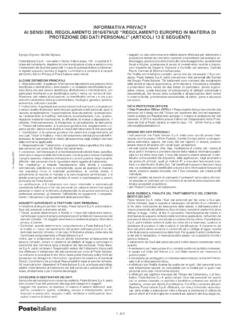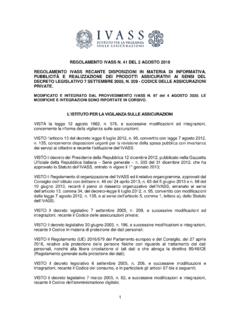Transcription of The Importance of Strengthening Prisoners' Family Ties to ...
1 August 2017 The Importance of Strengthening Prisoners' Family Ties to Prevent Reoffending and Reduce Intergenerational Crime by Lord Farmer3 Final Report from The Farmer ReviewContents1. Foreword 4 2. Executive Summary 73. Chapter 1: Introduction 164. Chapter 2: The right framework for improvement 325. Chapter 3: Raising standards 48 6. Chapter 4: Empowered governors 55 7. Chapter 5: Safe and secure prisons 768. Chapter 6: Developing our leaders and staff 87 9. Chapter 7: Building the right estate for reform 95 10. Appendix 10845 Final Report from The Farmer ReviewFinal Report from The Farmer ReviewForeword from the Chair, Lord Farmer The Farmer Review on the Importance of Family and other relational ties was commissioned as part of this Government's plans to effect the biggest overhaul of prisons in a generation, demonstrating their understanding of the Importance of good Family and other relationships to prisoners rehabilitation.
2 This report is submitted with the intention of being as helpful as possible to the Secretary of State as he rolls out the wider reform Ministry of Justice s own research shows that for a prisoner who receives visits from a Family member the odds of reoffending are 39% lower than for those who do Yet the clearest finding from my work and the conclusion of Her Majesty s Inspectorates of Prison and Probation and others is that there is an unacceptable inconsistency of respect for the role families can play in boosting rehabilitation and assisting in resettlement across the prison report is not sentimental about prisoners families, as if they can, simply by their presence, alchemise a disposition to commit crime into one that is law abiding.
3 However, I do want to hammer home a very simple principle of reform that needs to be a golden thread running through the prison system and the agencies that surround it. That principle is that relationships are fundamentally important if people are to change. In the course of my Review I met an army of people who instinctively recognised this. Prison governors, their management teams and prison officers of all ranks, as well as the voluntary sector organisations that exist to ensure families and prisoners can keep in touch and have the best relationships possible in highly constrained present the challenges those employed in the prison system are facing every day particularly the understaffing, overcrowding and violence are impeding their ability to build relationships with the men in their care and hampering the development of programmes and approaches that would enable families to play a greater role in rehabilitation.
4 That is why the system needs to be gripped in the ways proposed in the recently published white paper on prison safety and reform. The clarification of responsibilities and the plans to empower governors are especially welcome. However, the emergence of a rehabilitation culture inside every prison, which the Secretary of State s plans are pushing towards, will not happen unless good relationships with families and others on the outside are treated as a much higher priority in many jails. These need to be seen as a vital resource and the people who visit, and make the often Herculean effort to keep in contact, need to be treated as valued allies in the rehabilitation cause.
5 1 May C., Sharma N. and Stewart D., (2008). Factors linked to reoffending: a one-year follow-up of prisoners who took part in the Resettlement Surveys 2001, 2003 and 2004. London: Ministry of Justice. Employment and education are repeatedly cited as mainstream rehabilitation activities in offender management that all prisoners are expected to undertake whilst, in stark contrast, work to maintain and improve Family and other relational ties is rarely even mentioned. Yet such work can provide meaning and all-important motivation to these other strands of activity. It also has proven success in preventing reoffending in its own right.
6 If reform is to be achievable in our prisons it is essential that Family work should always be seen and referred to alongside these two as the third leg of the stool that brings stability and structure to prisoners lives, particularly when they leave prison. We have to use all the tools at our disposal if we are to put a crowbar into the revolving door of repeat reoffending and tackle the intergenerational transmission of crime. In this era of ongoing constriction on public spending, Family ties are themselves a resource that newly empowered governors can, and must, deploy in the interest not just of reducing reoffending rates, but also of creating a more settled regime.
7 There are many people I want to thank for their contribution to the work of this Review. First, I am thankful to Anne Fox, CEO of Clinks who, as Deputy Chair of my Task Group has been a constant source of encouragement and assistance, and to the other members: Diane Curry OBE, Partners Of Prisoners (POPS); Ilid Davies, National Probation Service (NPS); Craig Georgiou, Contract Directorate for Community Rehabilitation Companies, HMPPS; Garry Henry, User Voice; Andy Keen-Downs, Pact and Corin Morgan-Armstrong, Head of Family Interventions at HMP Parc. The Task Group was greatly assisted by officials from Her Majesty's Prison and Probation Service (HMPPS), then the National Offender Management Service (NOMS) Richard Booty, Zane Podniece and Paul Baker; and from the Ministry of Justice Melena Ward (who took over from Gabrielle Lee part way through the Review) , Angela Christopher MBE and Graham Mackenzie.
8 Clinks, who provided the secretariat to the Review, worked extremely hard to meet the very tight timelines required. In particular, I would like to thank Oonagh Ryder who analysed the very large body of evidence we received in response to the Call for Evidence. Her rigour, unstinting effort and enthusiasm for the whole process were exemplary. Richard Nicholls, Nathan Dick, Patrice Lawrence and Natasha Phiri also made a significant am very grateful to HMPPS who generously contributed towards my costs, as did the philanthropist Lady Edwina Grosvenor. Similarly, Clinks dipped into their own resources to ensure no effort was spared in carrying out the work.
9 67 Final Report from The Farmer ReviewFinal Report from The Farmer ReviewThe report makes clear that a very large number of people and organisations responded to my Call for Evidence. I am grateful to them all, but I particularly want to thank the many prisoners and their families who wrote, left voicemails or talked in person to me about their experiences and , I am greatly indebted to my Parliamentary Adviser, Dr Samantha Callan, who has been tireless in her wise counsel, organisational skills, research and certainly not least as the lead writer of the final FarmerExecutive Summary IntroductionThe Secretary of State commissioned this Review to investigate how supporting men in prison in England and Wales to engage with their families.
10 Can reduce reoffending and assist in addressing the intergenerational transmission of crime (a landmark study found that 63% of prisoners sons went on to offend themselves2) as part of the Government's urgently-needed reform agenda. The Ministry of Justice s own research shows that, for a prisoner who receives visits from a partner or Family member, the odds of reoffending are 39% lower than for prisoners who had not received such Supportive relationships with Family members and significant others give meaning and all important motivation to other strands of rehabilitation and resettlement activity. As one prisoner told me, If I don t see my Family I will lose them, if I lose them what have I got left?














